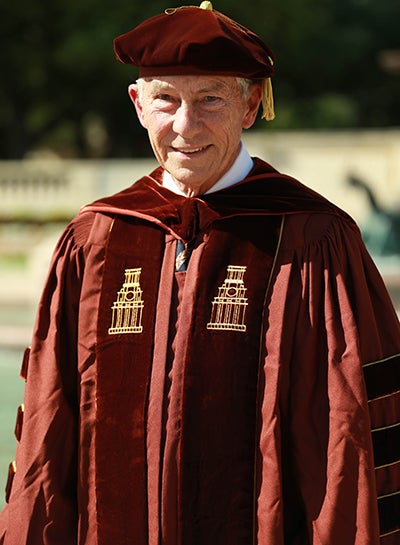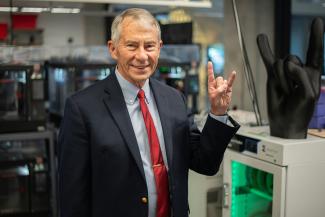
It's never too late to go back to school, just ask Chuck Corley.
11 years after joining Texas ECE, after a career that took him from the Air Force to industry, Charles J. (“Chuck”) Corley earned his Ph.D. in ECE in December 2024. He is the oldest person to ever earn a Ph.D. at the Cockrell School of Engineering and The University of Texas at Austin. This Saturday, he will walk across the stage and be hooded by his advisor, Prof. Earl Swartzlander.
Chuck’ Corley’s parents were high school sweethearts who married at 18 while his father was on leave from the Pacific Theater in the Army Air Corps during World War II. After the end of the war, while his father was a forestry student at West Virginia University on the GI Bill, Charles J. Corley was born. His mother worked as a telephone operator, and his father would babysit by taking him to class.
“It was a family joke that I had attended more dendrology classes than some of my Dad’s truant classmates,” said Corley.
When his father graduated in 1950, the family moved to southern Mississippi where his dad accepted a job as the area forester for a paper company. After graduating high school, Chuck gained admittance to the United States Air Force Academy.
“Mississippi’s primary education system was 48th in the nation when I was growing up – and then we added two more states. Competition for an appointment to the Air Force Academy was less than it would have been from a more populous state,” said Corley.
Chuck struggled at first with courses like calculus that more fortunate classmates had already had in high school.
“I was always intrigued with electronics – checking out books in high school from the local library that were way over my head,” said Corley.
In 1968, Chuck Corley graduated from the U.S. Air Force Academy with a BS in electrical engineering. Chuck made the Dean’s List all eight semesters and graduated as the “Outstanding Cadet in Electrical Engineering” with a 4.0 average. He received an award for the “Best Original Work in Natural Science and Engineering” for an audio tone decoder that used most of a box of 100 bipolar transistors that cost $35 apiece. An equivalent transistor today would cost approximately 39 cents. But the future in 1968 didn’t offer the same choices most of our undergraduates have today.
“1968 was the peak of the Vietnam War. Graduate school was not an option for most cadets.”
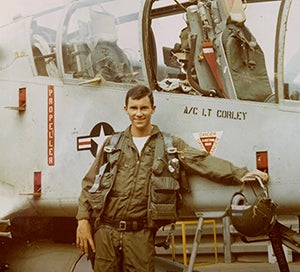
Chuck went to pilot training and on to a tour as a forward air controller in Vietnam. After his deployment, he returned to the States as an instructor pilot at the old Reese Air Force Base in Lubbock, TX. In 1973, as U.S. forces pulled out of Vietnam, the Academy sponsored his master’s degree at the Massachusetts Institute of Technology in order to return to the Academy and teach.
“The technology was just changing to integrated circuits. When I was at MIT, there were only two dummies there: me and the guy who let me in,” said Corley.
Chuck taught electrical engineering at the Air Force Academy for four and a half years. The courses included an educational computer built with nand-gate integrated circuits and, in the later years, the then revolutionary Intel 8080 microprocessor. Despite his commanders’ support for a Ph.D., the Air Force rated assignments office wanted him back in the cockpit due to a pilot shortage.
Instead, in 1979, Chuck left the Air Force and moved his family to Austin to work at Texas Instruments’ Computer Systems Division. There he designed ICs and circuit boards for TI’s last 16-bit mini-computer. He also managed hardware design for the Explorer artificial intelligence workstation which was built on a proprietary microprocessor. Meanwhile, he completed an MBA at St. Edward’s University where he finished with a 4.0 GPA.
In 1988, he moved to Motorola to be in engineering management and technical marketing for Motorola’s first RISC (reduced instruction set) microprocessor and the follow-on PowerPC microprocessors designed in collaboration with Apple Computer and IBM. He was still there in 2005 when it became Freescale Semiconductor and in 2015 when Freescale became NXP Semiconductor.
Chuck’s wife of 53 years, Linda, is an Air Force veteran as well.
“We met in Ft. Walton Beach FL where she was just back from a tour in Vietnam as an intensive care nurse and I was training in the OV-10. Our kids think it is funny that she was a captain and I was only a 1st Lieutenant.”
They have a daughter, Caryn, and a son, Chris. As he and Linda watched their children and grandchildren grow up in Austin, Chuck returned to school to study Computer Programming at Austin Community College (ACC).
“I’ve programmed most of my career. If the Academy had allowed minors, I would have had enough programming course to minor in Computer Programming. I’ve worked with a chronological list of languages like ALGOL (ALGOrithmic Language), SNOBOL (“StriNg Oriented and symBOlic Language”), Basic, Fortran, Pascal, Lisp, C, C++, Python, etc. I tried to keep my technical edge even while managing,” said Corley.
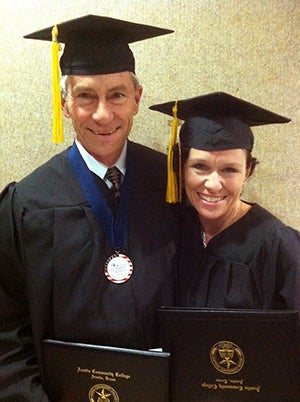
After raising two children, Chuck’s daughter Caryn also joined ACC to pursue a degree in finance and a career in financial planning.
“There was a semester when my daughter, her daughter as a high schooler, and I were all at ACC,” said Corley.
Chuck and Caryn graduated from ACC together in 2013. He then applied to The University of Texas at Austin graduate school.
When he first interviewed with Prof. Lizy John, she told him candidly, “you’re not the typical graduate student.” She recommended he interview with Prof. Earl Swartzlander who graciously said that if it didn’t require research money, he would sponsor his work.
But starting graduate education in your 60’s presents problems that most students don’t have to face.
“The courses in computer architecture were daunting for an “old” student,” said Corley. “Most younger students are reluctant to be teamed with an old guy."
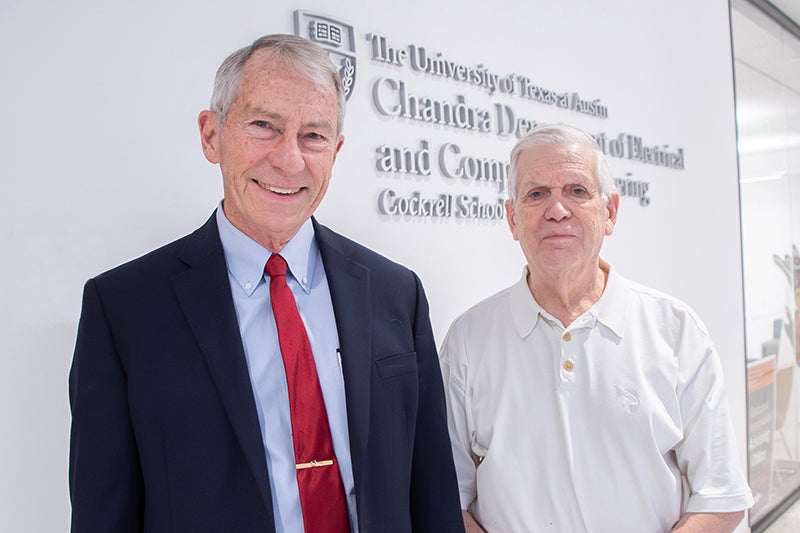
"It’s like being the last one chosen for the pickup baseball game. I was more popular when the professor just assigned people to teams. I always tried to be a contributor though the network that younger students associate with is a big assist that I didn’t have. Thank goodness for younger lab partners who had recently completed undergraduate degrees in the latest technologies. There were classes where the knowledge base of the younger teammates carried us all through.”
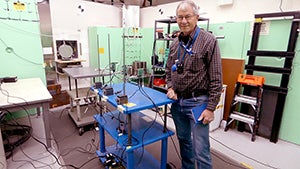
After Chuck retired in 2019, a chance encounter with Dr. Heather Quinn, a Los Alamos radiation effects scientist and editor of the IEEE Transactions in Nuclear Science, in an early morning exercise class at the 2019 Nuclear Science and Radiation Effects Conference was instrumental in his future education. A flyer distributed by Prof. Diana Marculescu, department chair of the Chandra Family Department of Electrical and Computer Engineering, advertised the Los Alamos 2021 Radiation Effects Summer School with Dr. Quinn as an organizer. Chuck applied and was accepted to the program, and Dr. Quinn became his mentor for a student fellowship at the Los Alamos Center for Space and Earth Science. In that role, more experiences testing microprocessors in the accelerated neutron beam at LANSCE followed.
Chuck’s dissertation on radiation effects in microprocessors running Linux was accepted by the UT faculty in November 2024 after 11 years at Texas ECE. Prof. Swartzlander was the committee chair. At 78, Chuck says he doesn’t feel any more special or unique than any other student. He had struggles and successes like any other student.
“My most difficult course was Probability and Stochastic Processes taught by Prof. Gustavo De Veciana. I struggled despite attending every additional instruction hour available – along with quite a few of my classmates,” said Corley.
Chuck Corley will walk across the stage at the Commencement ceremonies with his classmates this Saturday to receive his Ph.D. from The University of Texas at Austin.
“Chuck is a very determined and disciplined man,” said his wife Linda. “A Ph.D. was a lifelong goal, and he diligently worked toward it many years. He always was able to make time for the family, and we are all proud of his accomplishment. Our granddaughter says that he has inspired the lifelong learning gene in her.”
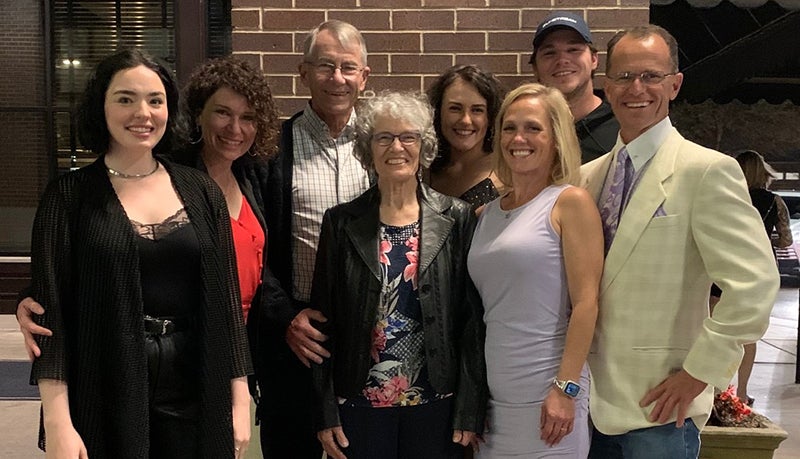
“I exercise a lot – about two hours every day between a morning run and two long walks with the dogs. My wife once commented, ‘You’ve always run; as long as we’ve been married you have always run.’ I’ve run two marathons and learned something that I applied in the arduous task of completing my dissertation: Don’t quit. Just keep plodding forward. I may not be the best; I might even be last; but if I just keep putting one foot in front of the other, I will finish.”
Hook ‘em, Chuck. Go change the world.
